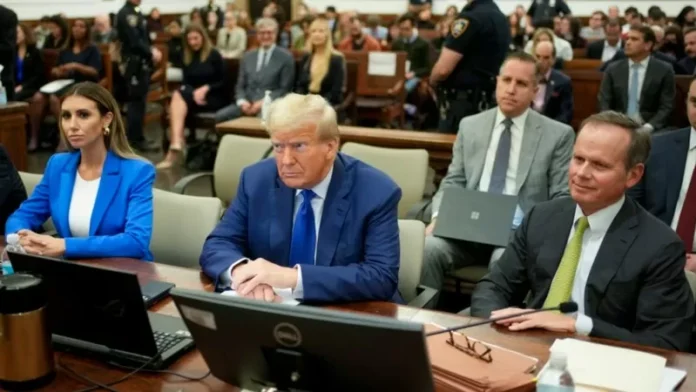New York City – In a major legal setback for former U.S. President Donald Trump, a New York judge has ruled that he must pay $354.9 million in penalties for fraudulently overstating his net worth to dupe lenders. This ruling, handed down on Friday by Justice Arthur Engoron, also includes a three-year ban on Trump serving as an officer or director of any New York corporation.
The ruling comes as part of a civil case brought by New York Attorney General Letitia James, which accused Trump and his family businesses of overstating his net worth by as much as $3.6 billion a year over a decade in order to secure better loan terms from banks. The judge’s ruling also includes an order for Trump’s adult sons, Don Jr. and Eric, to each pay $4 million.
In his ruling, Engoron wrote that Trump and the other defendants in the case “are incapable of admitting the error of their ways.” He went on to criticize their lack of contrition and remorse, stating that their behavior “borders on pathological” and that they have adopted a “See no evil, hear no evil, speak no evil” posture that is contradicted by the evidence.
Trump’s lawyer, Alina Habba, released a statement calling the ruling a “manifest injustice” and the “culmination of a multi-year, politically fueled witch hunt” against Trump. She also stated that the decision would send a message to all Americans that New York is no longer open for business. Habba plans to appeal the ruling.
Trump has consistently denied any wrongdoing and has called the case a political vendetta by James, an elected Democrat. However, the judge’s ruling could have serious implications for Trump’s real estate empire, as he currently leads the race for the Republican nomination to challenge Democratic President Joe Biden in the upcoming U.S. election on November 5th.
During the trial, Trump’s testimony was described as defiant and meandering, with the former president conceding that some of his property values were inaccurate but insisting that banks were responsible for conducting their own due diligence.
Engoron criticized Trump for his behavior during his trial testimony, stating that his refusal to answer questions directly and his tendency to go off-topic severely compromised his credibility. This could have played a significant role in the judge’s decision to rule against Trump and his family businesses.
The ruling also comes after a contentious three-month trial in Manhattan, which was decided by the judge without a jury. Trump used his occasional court appearances as impromptu campaign stops, delivering incendiary remarks to reporters and claiming that his enemies were using the courts to prevent him from retaking the White House.
Despite a host of other legal troubles, Trump is currently leading by a wide margin in the race for the Republican nomination. He is under indictment in four criminal cases, including one in New York related to hush money payments he made to a porn actress ahead of the 2016 election.
In addition to the New York case, Trump is also facing charges in Florida for mishandling classified documents upon leaving office, as well as in Washington and Georgia for his efforts to overturn his 2020 election loss. Trump has pleaded not guilty in all four cases.
It is unclear how much access to cash Trump currently has, with estimates of his fortune varying. Forbes has pegged his net worth at $2.6 billion, while Trump himself testified in an April deposition that he had roughly $400 million in cash.
Friday’s ruling is a significant blow to Trump’s real estate empire and could have far-reaching consequences for his future business dealings. It remains to be seen how Trump will respond to this latest legal setback, but one thing is clear – the former president’s troubles are far from over.

